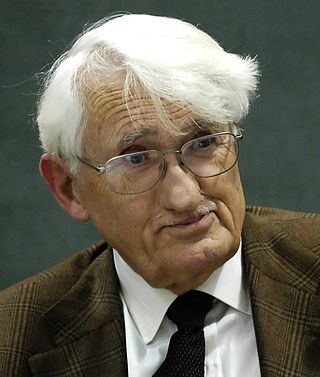Moderate variant of nationalism
Moderate nationalism is a moderate version of nationalism.
| Part of a series on |
| Nationalism |
|---|
| |
Moderate nationalism is a moderate version of nationalism.
Subtypes include civic nationalism (liberal nationalism). Moderate nationalism is similar to patriotism, except that moderate nationalism is focused on cultural and ethnic issues, while patriotism puts more value on forming a civic community and loyalty to the state. [1]
Moderate nationalism had a role in Irish nationalism [2] and Indian nationalism. [3]
South Korea's liberal movements are considered moderate nationalists given their support for immigrant rights and foreign voting rights. [4]
Some American opinion articles[ by whom? ] called for the adoption of moderate nationalism by the society of the United States in the 2010s. [5] [6]
Nationalism is an idea and movement that holds that the nation should be congruent with the state. As a movement, it tends to promote the interests of a particular nation, especially with the aim of gaining and maintaining the nation's sovereignty (self-governance) over its perceived homeland to create a nation-state. It holds that each nation should govern itself, free from outside interference (self-determination), that a nation is a natural and ideal basis for a polity, and that the nation is the only rightful source of political power. It further aims to build and maintain a single national identity, based on a combination of shared social characteristics such as culture, ethnicity, geographic location, language, politics, religion, traditions and belief in a shared singular history, and to promote national unity or solidarity. Nationalism, therefore, seeks to preserve and foster a nation's traditional culture. There are various definitions of a "nation", which leads to different types of nationalism. The two main divergent forms identified by scholars are ethnic nationalism and civic nationalism.

Patriotism is the feeling of love, devotion, and a sense of attachment to one's country. This attachment can be a combination of different feelings for things such as the language of one's homeland, and its ethnic, cultural, political, or historical aspects. It may encompass a set of concepts closely related to nationalism, mostly civic nationalism and sometimes cultural nationalism.
Right-wing politics describes the range of political ideologies that view certain social orders and hierarchies as inevitable, natural, normal, or desirable, typically supporting this position based on natural law, economics, authority, property or tradition. Hierarchy and inequality may be seen as natural results of traditional social differences or competition in market economies.

Irish nationalism is a nationalist political movement which, in its broadest sense, asserts that the people of Ireland should govern Ireland as a sovereign state. Since the mid-19th century, Irish nationalism has largely taken the form of cultural nationalism based on the principles of national self-determination and popular sovereignty. Irish nationalists during the 18th, 19th, and 20th centuries such as the United Irishmen in the 1790s, Young Irelanders in the 1840s, the Fenian Brotherhood during the 1880s, Fianna Fáil in the 1920s, and Sinn Féin styled themselves in various ways after French left-wing radicalism and republicanism. Irish nationalism celebrates the culture of Ireland, especially the Irish language, literature, music, and sports. It grew more potent during the period in which all of Ireland was part of the United Kingdom, which led to most of the island gaining independence from the UK in 1922.
Majoritarianism is a political philosophy or ideology with the agenda asserting that a majority based on a religion, language, social class, or other category of the population, is entitled to a certain degree of primacy in society, and has the right to make decisions that affect the society. This traditional view has come under growing criticism, and liberal democracies have increasingly included constraints on what the parliamentary majority can do, in order to protect citizens' fundamental rights.
Moderate is an ideological category which designates a rejection of radical or extreme views, especially in regard to politics and religion. A moderate is considered someone occupying any mainstream position avoiding extreme views. In American politics, a moderate is considered someone occupying a centre position on the left–right political spectrum.
Korean nationalism can be viewed in two different contexts. One encompasses various movements throughout history to maintain a Korean cultural identity, history, and ethnicity. This ethnic nationalism was mainly forged in opposition to foreign incursion and rule. The second context encompasses how Korean nationalism changed after the partition in 1945. Today, the former tends to predominate.
Civic nationalism, also known as democratic nationalism and liberal nationalism, is a form of nationalism that adheres to traditional liberal values of freedom, tolerance, equality, individual rights and is not based on ethnocentrism. Civic nationalists often defend the value of national identity by saying that individuals need it as a partial shared aspect of their identity in order to lead meaningful, autonomous lives and that democratic polities need national identity to function properly.

Constitutional patriotism is the idea that people should form a political attachment to the norms and values of a pluralistic liberal democratic constitution rather than to a national culture or cosmopolitan society. It is associated with post-nationalist identity because, while it is seen as a similar concept to nationalism, the attachment is based on the constitution rather than on a national culture. In essence, it is an attempt to re-conceptualize group identity with a focus on the interpretation of citizenship as a loyalty that goes beyond individuals' ethnocultural identification. Theorists believe this to be more defensible than other forms of shared commitment in a diverse modern state with multiple languages and group identities. It is particularly relevant in post-national democratic states in which multiple cultural and ethnic groups coexist. It was influential in the development of the European Union and a key to Europeanism as a basis for multiple countries belonging to a supranational union.
Left-wing nationalism or leftist nationalism is a form of nationalism which is based upon national self-determination, popular sovereignty, and left-wing political positions such as social equality. Left-wing nationalism can also include anti-imperialism and national liberation movements. Left-wing nationalism often stands in contrast to right-wing politics and right-wing nationalism.

British nationalism asserts that the British are a nation and promotes the cultural unity of Britons, in a definition of Britishness that may include people of English, Scottish, Welsh and Northern Irish descent. British nationalism is closely associated with UK or British unionism, which seeks to uphold the political union that is the United Kingdom, or strengthen the links between the countries of the United Kingdom.
Among scholars of nationalism, a number of types of nationalism have been presented. Nationalism may manifest itself as part of official state ideology or as a popular non-state movement and may be expressed along civic, ethnic, cultural, language, religious or ideological lines. These self-definitions of the nation are used to classify types of nationalism. However, such categories are not mutually exclusive and many nationalist movements combine some or all of these elements to varying degrees. Nationalist movements can also be classified by other criteria, such as scale and location.

Czech nationalism is a form of nationalism which asserts that Czechs are a nation and promotes the cultural unity of Czechs. Modern Czech nationalism arose in the 19th century in the form of the Czech National Revival. In 1848, Czech nationalism became an important political factor in the Austrian Empire due to the activities of the Old Czech Party, led by František Palacký. During World War I, Czech nationalist politicians, such as Karel Kramář in the Czech lands and Tomáš Garrigue Masaryk abroad, endorsed the idea of independence from Austro-Hungarian rule.

Italian nationalism is a movement which believes that the Italians are a nation with a single homogeneous identity, and therefrom seeks to promote the cultural unity of Italy as a country. From an Italian nationalist perspective, Italianness is defined as claiming cultural and ethnic descent from the Latins, an Italic tribe which originally dwelt in Latium and came to dominate the Italian peninsula and much of Europe. Because of that, Italian nationalism has also historically adhered to imperialist theories. The romantic version of such views is known as Italian patriotism, while their integral version is known as Italian fascism.
Ethnic nationalism, also known as ethnonationalism, is a form of nationalism wherein the nation and nationality are defined in terms of ethnicity, with emphasis on an ethnocentric approach to various political issues related to national affirmation of a particular ethnic group.

Slovak nationalism is an ethnic nationalist ideology that asserts that the Slovaks are a nation and promotes the cultural unity of the Slovaks.
Homonationalism is often seen as the favorable association between a nationalist ideology and LGBT people or their rights, but is further described as a systematic oppression of queer, racialized, and sexualized groups in an attempt to support neoliberal structures and ideals. The term was originally proposed by the researcher in gender studies Jasbir K. Puar in 2007 to refer to the processes by which neoliberal and capitalist power structures line up with the claims of the LGBT community in order to justify racist, xenophobic and aporophobic positions, especially against Muslims, basing them on prejudices that immigrants are homophobic and that Western society is egalitarian. Thus, sexual diversity and LGBT rights are used to sustain political stances against immigration, becoming increasingly common among far-right parties. In Terrorist Assemblages, Puar describes homonationalism as a "form of sexual exceptionalism [dependent on the] segregation and disqualification of racial and sexual others" from the dominant image of a particular society, most often discussed within an American framework.
Cypriot nationalism, also known as Cypriotism, refers to one of the nationalisms of Cyprus. It focuses on the shared identity of Greek Cypriots and Turkish Cypriots regarding their "Cypriotness", highlighting their common Cypriot culture, heritage, traditions, and economic, political, and social rights. Cypriot nationalism supports the peaceful reunification of Cyprus and the end of interference of external powers in its domestic affairs. Some Cypriotists advocate a confederal or federal state, while others express a preference for a unitary state instead. Cypriot nationalists consider Cypriots as one nationality and even ethnicity, referring to linguistic distinction between Cypriots as "Greek"-speaking Cypriots and "Turkish"-speaking Cypriots, rather than two separate ethnic groups.
Moreover , the book's coverage of terminates well before Roh Moo-Hyun's moderate nationalist presidency ( 2003– 2008 ) was overtaken by the conservative backlash.